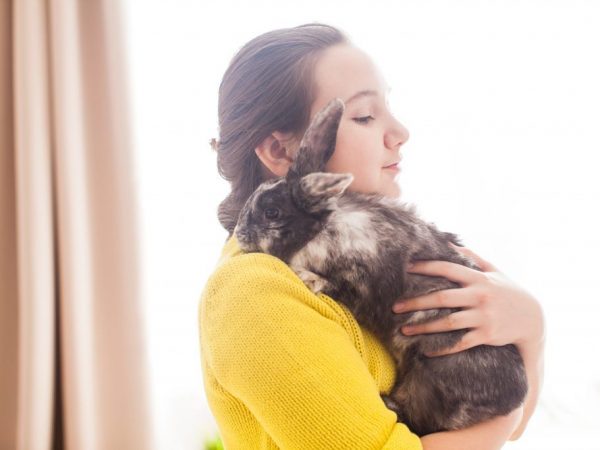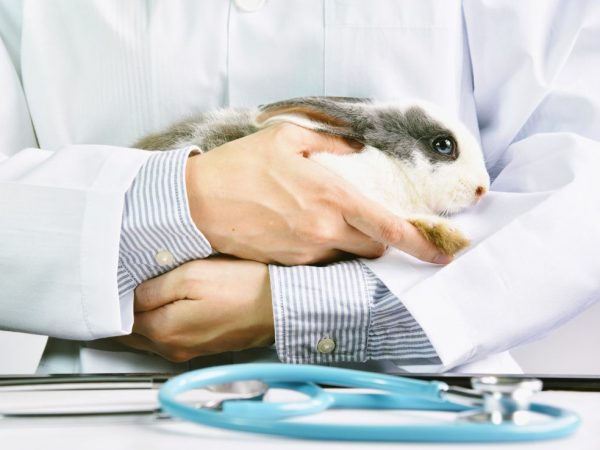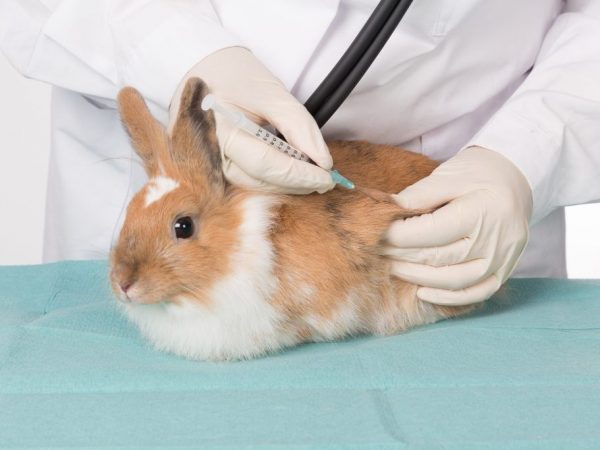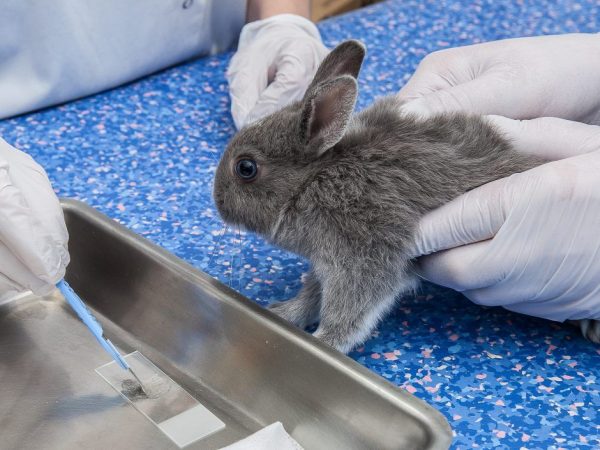List of medicines for rabbits
Sooner or later, every farmer is faced with rabbit diseases. In such a situation, it is best to have the medications you need for home treatment. We will find out which medicines for rabbits are used most often, and which ones should be discarded.
- What should be in a rabbit breeder's first aid kit
- Preparing for treatment
- Antibiotics
- Enrofloxacin
- Bicillin or benzylpenicillin
- Oxytetracycline
- A group of prohibited antibiotics
- Antiseptic group of drugs
- Furalicin
- Chlorhexidine
- Alcoholic tinctures and solutions, classic brilliant green and iodine
- Pain relievers
- Medicines for coccidiosis
- Anti-worm preparations
- Medicines for skin parasites
- Advantage
- Lawyer
- Advantix
- Stronghold
- Ivermectin
- Treatment of gastrointestinal diseases
- Cerucal
- Enterosorbent group
- Rabbit stimulants

Rabbit medications
What should be in a rabbit breeder's first aid kit
Every experienced breeder has a first aid kit next to the flock of animals. In addition to the fact that there are medicines and essential medicines, you need to take care of the availability of disinfectants, materials for dressings.
List of medicines:
- iodine solution no more than 5% or brilliant green;
- boric alcohol;
- ichthyol-based ointment;
- streptocide;
- glucose, saline;
- a variety of antibiotics;
- vaccines against the most dangerous diseases of rabbits.
What disinfectants should be in the medicine cabinet? There should be several means that are used for disinfection. Most often, this group includes ASD, creolin or bleach. In addition, you can purchase classic formalin or caustic soda.
Rabbits are often injured, so you need to have in the first-aid kit all the tools you need to treat wounds and treat them. The list should contain sterile bandages and cotton wool, napkins, gauze, syringes. It will not be superfluous to include in the list a medical scalpel, tweezers, a pipette, beakers for weighing medicines, and so on.
Preparing for treatment
Do not forget that rabbits do not tolerate stress well; due to a nervous shock, their disease may worsen, which will lead to death. Home treatment is very stressful for the pet, this must be taken into account before soldering the rabbit with medications or starting a course of injections.
Before proceeding with direct treatment, you need to properly prepare both the rabbit and its place. It is important to choose a time when the fluffy will be calm and well-fed: in this state, he is most calm. You should also make sure that there are no objects nearby that can be injured. If the animal behaves restlessly, it makes sense to wrap the rabbit loosely, a regular towel or piece of cloth will do for this.

Preparing the rabbit for treatment
If the treatment involves taking pills, they can be given in several ways:
- Feed your pet a pill from your hand.
- Hide the pill in the treat.
- Crush the tablet and add it to the feed.
- You can also dissolve the medication in water, if it is not prohibited by the instructions.
- Inject the drug through a syringe without a needle.
- If the drug for the treatment of a rabbit is produced in the form of drops or ointment, all manipulations must be carried out on the floor: this way it is easier to immobilize the rabbit. It is important to act strictly according to the instructions and not to self-medicate, as it can be completely sad.
Antibiotics
First, it is worth talking about what antibiotics can be used to treat rabbits:
Enrofloxacin
This active ingredient is found in preparations such as Baytril for rabbits, Baykoks (or its cheaper analogue Turokoks), Enrox, and so on. This group of antibiotics is most commonly prescribed by veterinarians. Its popularity is due to the fact that the drug has a wide spectrum of action, is used to treat infections of the respiratory system, diseases of the genitourinary system (for example, with kidney stones) and in the complex therapy of wounds and injuries. The course of treatment with Baytril usually lasts about 5-8 days, unless otherwise prescribed by a doctor. As for the limitations, it is not recommended to treat young animals with Baytril, as this can negatively affect the structure of the skeleton.
Bicillin or benzylpenicillin
This drug also belongs to antibiotics, the active ingredient is penicillin. Its advantage lies in the fact that it is the only drug of the penicillin group that is normally tolerated by small rodents. Benzylpenicillin can be used to treat acute conditions as well as to relieve chronic symptoms. This includes chronic rhinitis, ear diseases, and respiratory diseases. The downside is that the course of treatment usually lasts about 30 days.

Antibiotics for the treatment of rabbits
Oxytetracycline
Recently, the frequency of its prescription has decreased significantly, as new antibiotics of a new generation appear. However, in the treatment of pastrellosis, Oxytetracycline is practically irreplaceable, because it works just as effectively as Enrofloxacin, Enroflon and Enromag. The drug is produced in the form of ampoules with liquid, which is injected intramuscularly to rabbits.
The antibiotics Tetramisole and Zinaprim have also proven themselves well. Moreover, Zinaprim is the most successful, since it contains 2 active ingredients at once - sulfadimidine and trimethoprim, which makes Zinaprim a strong remedy against infection.
A group of prohibited antibiotics
Here is a list of antibiotics that should never be used to treat rabbits:
- Lincomycin;
- Ampicillin;
- Tylosin;
- Tromexin;
- Clindamycin;
- Erythromycin.
In addition to the fact that these drugs can cause severe poisoning after ingestion, there is a risk that the rabbit will die from toxic shock.
We have listed not commercial names, but active ingredients. In order to save a rabbit's life, you need to carefully read the chemical composition of each medication before giving it to the rabbit.
Antiseptic group of drugs
The rabbit breeder's first-aid kit should contain antiseptics.
Furalicin
It is usually available in the form of yellow tablets, which must then be diluted in water. However, there is furacilin in the form of an alcohol solution, it is strictly prohibited to use it.
Chlorhexidine
This product can be bought in several versions: ready-made solution, liquid concentrate, gel or cream. Chlorhexidine treats wounds and cuts, as well as wounds with open fractures or in the postoperative period. In addition, having achieved the desired concentration, it is possible to irrigate the oral cavity of the rabbit with the help of a chlorhexidine solution.

Antiseptic drugs
Alcoholic tinctures and solutions, classic brilliant green and iodine
Veterinarians do not recommend using the above agents for treating rabbits, as if the dosage is incorrect, there is a possibility of burns.However, as a means of first aid, drugs can still be used, having previously made an aqueous solution based on them, or you can buy Iodinol ready-made.
Pain relievers
Pain relievers, or analgesics, are used when the rabbit is in pain. This can be, for example, fractures, postoperative time, acute toothache, intestinal colic, increased gas production, and so on. Veterinarians prefer non-steroidal analgesics. The fact is that their side effects are not so extensive, mainly only the gastrointestinal tract suffers, especially often if the course of treatment is delayed.
What drugs can be used to relieve pain:
- Ketoprofen (Ketonal), Ketanov;
- Rimadyl or Karptophen;
- Meloxicam.
Separately, it must be said about the drugs that are used by humans to get rid of pain. These are classic medicines: No-shpa, Analgin, Ibuprofen, Ledocaine and Baralgin. Veterinarians prohibit their use in treatment, but a single dose is still allowed if nothing else is at hand.
Medicines for coccidiosis
Coccidiosis is a dangerous rabbit disease that is fatal in more than half of the cases. Such drugs as Aimeterm, Baytril, Amprolium, Tolucox, Baycox, Toltrazuril and others are successfully fighting coccidia - the causative agents of the disease.
The dosage and course of treatment with Aymeterm and other drugs should be selected depending on the age of the sick rabbit, as well as on how much the animal weighs. Veterinarians recommend, when self-treatment, to act strictly in accordance with the instructions, not to increase or decrease the dose, also not to prolong the treatment or shorten it.
Separately, let's say about such a medicine as Trisulfone. It is used as the main therapy against coccidiosis (eimeriosis) and also as a treatment for diseases caused by parasites.

Medicines for coccidiosis
We list all the medicines that can be useful in the treatment of coccidiosis:
- Diclazuril;
- Torucox and Tolucox;
- Amprolium;
- Eimeterm;
- biseptol;
- Phthalazole;
- Trichopolus.
Usually, the course of treatment lasts about 5-7 days, after which a pause is made, and then the course is repeated again.
Anti-worm preparations
All drugs for getting rid of worms contain fenbendazole, praziquatel or pyrantel, this must be indicated in the instructions. If we list the commercial names, then these are Profender, Shustrik, Pirantel, Panakur, Dirovn and Febtal.
When choosing a treatment for worms for a rabbit, you should pay attention to Albendazole. On the territory of Russia, you can find a lot of positive feedback that with its help it was possible to rid the rabbit of worms in the shortest possible time. However, the experience of Western colleagues of veterinarians suggests that Albendazole cannot be called safe due to its high toxicity.
Medicines for skin parasites
Rabbits often suffer from the fact that unwanted guests - parasites - settle on their skin. In this case, the use of drugs such as Advantage, Advocate, Advantix and so on is recommended. Let's talk about them in more detail.
Advantage
It is used to treat parasitic lesions of rodents, destroys fleas, lice, as well as their eggs and larvae. The drug is intended for external use only.
Lawyer
It differs in that after its use, the animal receives long-term protection from fleas, lice, ticks, as well as lice. Its duration is up to thirty days. The Lawyer is applied by analogy with Advantage externally by squeezing the contents of the bottle into the withers of the rabbit.
Advantix
Another analogue of Advocate and Advantage, also used only externally. Protects against parasites for one month.
Stronghold
The drug has a lot of positive reviews, many rabbit breeders have managed to remove skin and subcutaneous parasites with its help.It is also used as a prophylaxis to prevent re-infestation of parasites.
Ivermectin
Ivermec should be used as an intramuscular injection. It has a detrimental effect not only on external parasites, but also on those that have settled in the digestive tract (helminths) or other internal organs. Dirofen has the same effect.
Otodectin, Amitrazine (for scabies), Lozeval (for fungi), Amprolium and so on are also used against parasites.
In no case should you use drugs that contain fipronil. First of all, we are talking about the drugs Bars and Front Line. Their side effects for the rabbit can be fatal, it is better to give preference to proven and effective drugs such as Amprolium.
Treatment of gastrointestinal diseases
Rabbits often have digestive problems. The reason for this may be banal indigestion, poisoning, or an abrupt transition from one diet to another. What medications can help a furry?
Cerucal
The action of the drug is designed to restore the normal functioning of all parts of the intestine. It is often used for violation of peristalsis after anesthesia or gastrostasis. Not recommended for self-use at home if the rabbit is diagnosed with stomach blockage due to the ingress of a foreign body or bezoar.
In addition, No-shpa, Meloxicam, Simethicone (found in Espumisan, Simplex drops, Tympanol drug) may be useful. Plain petroleum jelly (will help foreign bodies leave the rabbit's body naturally), Loperamide (an effective antidiarrheal agent), Sulfasalazine (has an anti-inflammatory effect on the gastrointestinal mucosa).
Enterosorbent group
Enterosorbents are needed in order to accelerate the evacuation of toxins released by bacteria, that is, to reduce the manifestation of intoxication. Often they accompany the complex treatment of diseases of the intestinal group. It is worth remembering that all enterosorbents must be given strictly before (2-3 hours) or after meals (also after 2-3 hours).
Rabbit stimulants
Rabbits need constant maintenance of immunity, which increases the body's resistance to external pathogens and diseases. For example, in veterinary medicine, Fosprenil is often used, which increases the rabbit's resistance to infections and viruses. The fact is that it contains selenium, which has a beneficial effect on the immune system and on the general health of the furry in general. For the same purpose, rodents are given vitamin complexes, strictly observing the dosage indicated in the annotation. Gammatonik and Nucleopeptide, which, in addition to vitamins, contain a lot of minerals, are considered to be successful drugs.
Some livestock breeders prefer plant vitamins, adding amaranth to the diet of rodents - a grass that rabbits eat with great pleasure. For more calories, soy is added to the grass, which only increases the nutritional value of the diet.
You can stimulate not only immunity, but also the ability to fertilize. So you can use Surfagon or Follimag in order to increase the chances of a quick pregnancy for the rabbit. However, it should be understood that such drugs are not a toy, the appropriateness of their use and dosage are indicated by a veterinarian.


